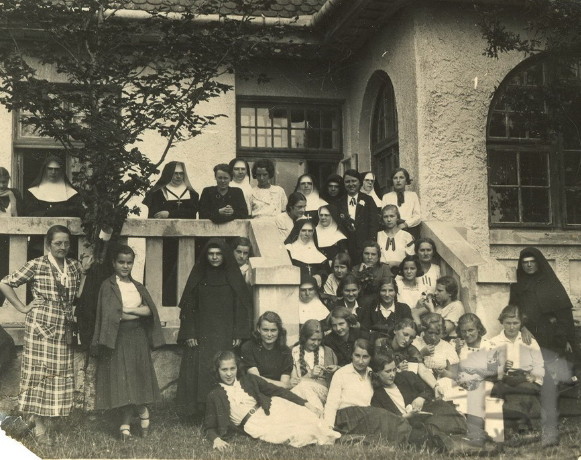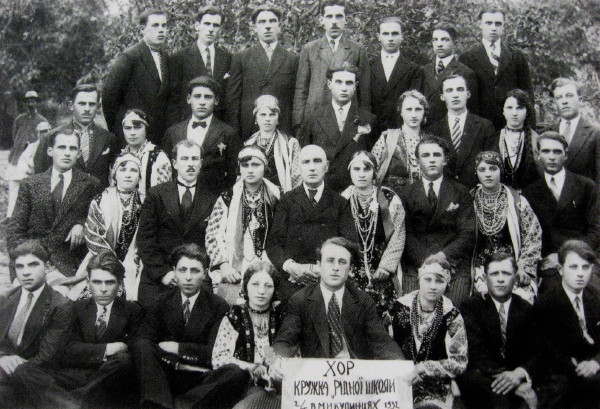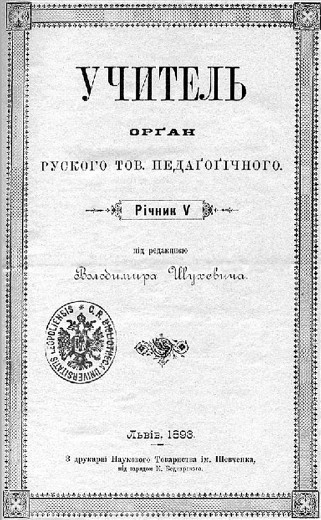Ridna Shkola society
Ridna Shkola society. The popular name of the Ruthenian (later Ukrainian) Pedagogical Society (Ruske Pedahohichne Tovarystvo), established in Lviv in 1881 to promote Ukrainian-language education. It was active in Galicia (later in Volhynia) until the Second World War. The society was founded (as the Ruthenian Pedagogical Society) in an attempt to redress the weakness of Ukrainian educational institutions in Galicia in the late 19th century. After an initial program of petitioning the government for broader Ukrainian educational access and sensitizing the Ukrainian population at large about educational matters, the society began sponsoring its own educational ventures. It established student bursas for village youths studying at institutes of secondary education (by 1905 there were 4 bursas in Lviv and 16 in other larger centers). Its publishing house, Biblioteka dlia Molodi, printed children's books and popular editions of fictional and semiacademic works. Ridna Shkola also published the children's journal Dzvinok (1892–1914) and school primers and textbooks. It dealt with the professional concerns of teachers before the establishment of the Ukrainian Teachers' Mutual Aid Society in 1905 and published the journal Uchytel’ (1889–1914). The society did not sponsor private schools of its own until 1898, when it opened a school for girls in Lviv. A teachers' seminary for girls in Lviv (1903) with a training school attached to it (in 1907) and primary schools in villages (from 1906) followed. In purely organizational terms the group saw a steady growth, from 83 members in 1881 to 943 in 1900 and to approx 3,000, with 33 branches, in 1906.
In 1912 the group changed its formal name from the Ruthenian to the Ukrainian Pedagogical Society (UPS). It also decentralized its structure, thereby becoming a federation of largely autonomous regional pedagogical councils. In the years preceding the First World War the UPS concentrated its efforts on opening new schools (secondary schools, preparatory courses for rural youths seeking to attend a gymnasium, and teachers' seminaries), starting literacy courses, forming libraries, expanding the bursa network (26 were established in 1907–14), and publishing. By 1914 the society was the sponsor of 18 elementary schools, 38 preparatory courses, and 7 gymnasiums. Its membership had grown to 4,814, organized in 59 branches. Lobbying of government institutions was instrumental in increasing the number of Ukrainian public schools (by 1914 there were 2,510 elementary schools, 6 gymnasiums, and 10 bilingual secondary seminaries providing Ukrainian-language education in Galicia). Some of the outstanding figures involved with the UPS before 1918 were Vasyl Ilnytsky, Ivan Chapelsky, Oleksander Barvinsky, Edvard Kharkevych, Ostap Makarushka, Tyt Voinarovsky-Stolobut, Anatol Vakhnianyn, Hryhorii Vretsona, Roman Zaklynsky, Kostantyna Malytska, Kost Pankivsky, Yuliian Romanchuk, Oleksander Stefanovych, and Volodymyr Shukhevych.
Immediately after the First World War the UPS faced an openly hostile Polish government intent on eliminating Ukrainian-language education. The number of Ukrainian-language schools in eastern Galicia had fallen to 352. In 1924 the society’s circumstances improved somewhat following constitutional changes. It was even granted permission to organize in Volhynia and other Ukrainian territories annexed by Poland. In 1926 ‘Ridna Shkola’ was formally added to the UPS name, although the group had been popularly known as such for several years. At the same time the organizational structure was tightened, with the Lviv headquarters overlooking a network of branches whose work was co-ordinated by county councils (povitovi soiuzy). By 1939 Ridna Shkola had 2,074 branches, with 105,000 members.
During this period Ridna Shkola became a central agency for the establishment of private Ukrainian educational institutions. By 1938 it was running 33 primary schools (6,100 students), 23 general education secondary schools (2,500 students), and 15 technical schools (1,500 students).
Ridna Shkola also sponsored educational classes for adults, concerts, and theatrical productions, as well as classes in a variety of areas (eg, Ukrainian studies, teacher upgrading, basic literacy, cooking). Local branches ran small lending libraries (653 in 1937, with a total of 72,207 books and 17,097 registered users). The organization’s publishing activity continued (specifically from 1932, with the illustrated journal Ridna shkola (Lviv) and its own publishing house), although it was considerably less than in the pre-1914 era. The organization also operated two bookstores.
Among the main figures in Ridna Shkola during the interwar period (in addition to a number of the pre-1914 activists) were Omelian Terletsky, Illia Kokorudz, Mykola Zaiachkivsky, Denys Korenets, Ivan Herasymovych, Olena Kysilevska, Myron Konovalets, Omelian Popovych, Markiian Terletsky, and Lev Yasinchuk.
The Ridna Shkola society was liquidated following the Soviet occupation of Western Ukraine in 1939. Most of its assets were transferred to the Ukrainian educational societies during the 1941–4 German occupation.
Organizations comparable to (and sometimes named after) Ridna Shkola were formed outside of Ukraine, in Europe and in North America, to co-ordinate private part-time Ukrainian education. These groups were not formally affiliated with Ridna Shkola, although they provided the central organization with funds raised through donation campaigns. Some of these groups have remained active to this day.
BIBLIOGRAPHY
Yasinchuk, L. P’iatdesiat lit Ridnoï Shkoly, 1881–1931 (Lviv 1931)
Volodymyr Kubijovyč
[This article originally appeared in the Encyclopedia of Ukraine, vol. 4 (1993).]



.jpg)
%201939.jpg)